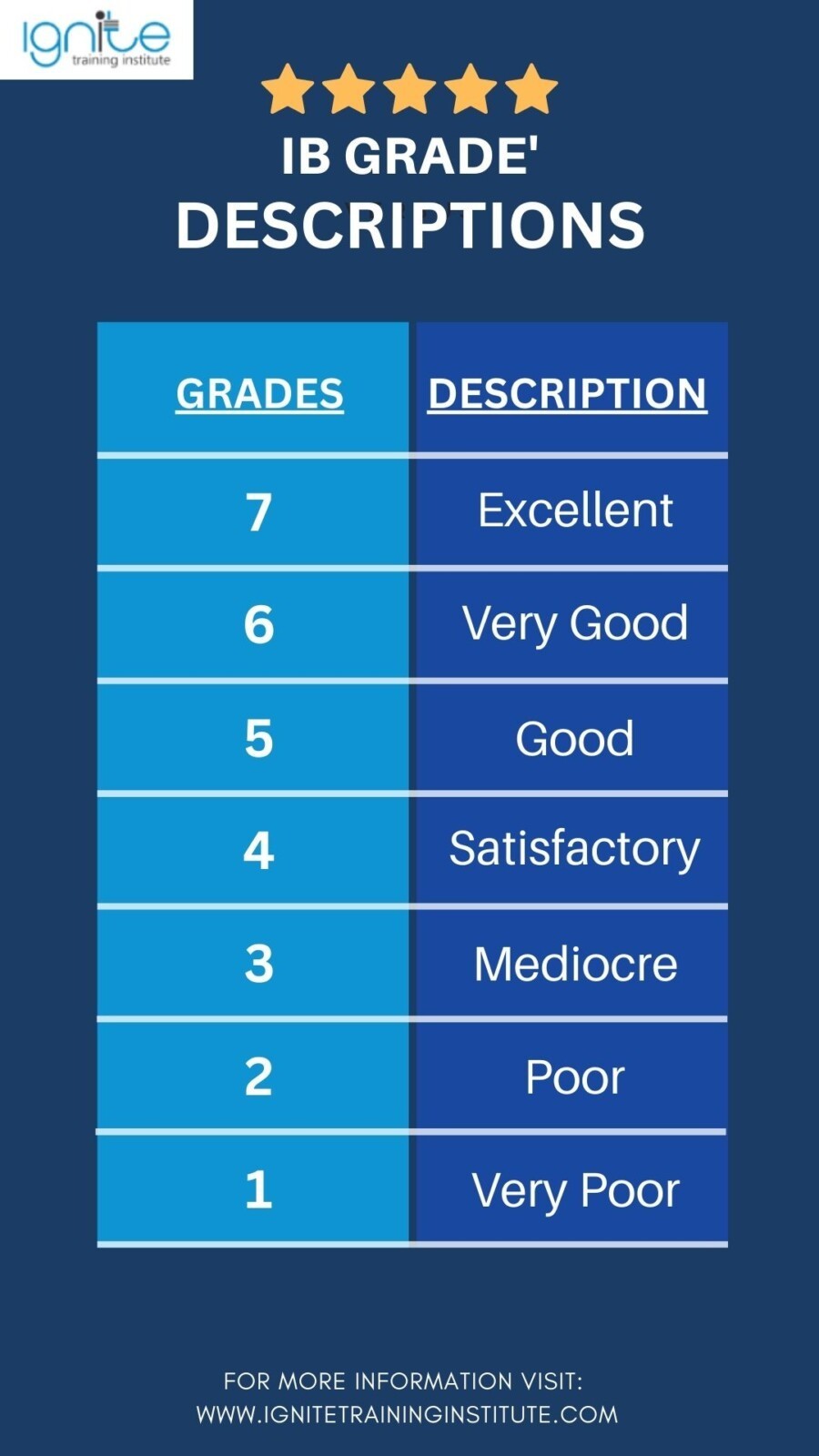Are you a student currently enrolled in the International Baccalaureate (IB) program, or perhaps a parent seeking clarity on your child’s academic journey? Understanding the IB grading system is crucial for charting a successful path through this rigorous curriculum.
The IB grading system is unique and designed to assess students’ depth of understanding and critical thinking across a broad range of IB subjects. With its holistic approach, it goes beyond traditional grading systems to evaluate students’ abilities to think critically, communicate effectively, and engage with global issues.
In this blog, we’ll delve into the intricacies of the IB grading system, demystifying its components and shedding light on what each grade truly signifies. Moreover, for students seeking academic support in their IB journey, Ignite Training Institute offers tutoring guidance to help students excel in IBDP and MYP curriculums.
What Is An IB Grading Scale 1-7?
The International Baccalaureate (IB) grading scale is a system used to assess the performance of students in the IB program. This scale consists of a range from 1 to 7, with 7 being the highest score achievable. Each subject in the IB program is graded using the same scale, except for the Theory of Knowledge (TOK) and the Extended Essay (EE), which use a different grading scale.
The IB grading scale is designed to measure the student’s mastery of the subject matter and skills taught in the program. A score of 7 on the IB grading scale is considered equivalent to an A+ or A in the traditional grading system, while a score of 1 is the lowest score achievable and indicates that the student did not meet the minimum requirements for the subject.
In addition to subject-specific grades, students also receive an overall IB diploma score, which is the total of all their subject grades. The maximum score achievable for the IB diploma is 45, with a minimum score of 24 required to pass. The IB grading scale emphasizes critical thinking, problem-solving, and analytical skills, which are essential for success in the program.
IB grades are typically equivalent to certain numerical scores for academic purposes:
- A grade of 7 is equivalent to an A+ or 97-100%
- A grade of 6 is equivalent to an A or 93-96%
- A grade of 5 is equivalent to a B or 85-92%
- A grade of 4 is equivalent to a C or 77-84%
- A grade of 3 is equivalent to a D or 70-76%
- A grade of 2 is equivalent to an E or 60-69%
- A grade of 1 is equivalent to an F or below 60%

Related: IB Computer Science Syllabus: HL & SL Complete Overview
IB Grades Explained For IB Diploma Programme
The grading system for the International Baccalaureate (IB) Diploma Program includes a separate grading scale for the Theory of Knowledge (TOK) and the Extended Essay (EE), which are both required components of the program.
The TOK grading scale ranges from A to E, with A being the highest score achievable. Students are assessed on their ability to think critically and reflectively about knowledge and how it is acquired. The assessment includes both a presentation and an essay, with a maximum combined score of 10. The TOK grade is then combined with the student’s Extended Essay grade to determine the additional points they will receive toward their overall diploma score.
The EE grading scale ranges from A to E, with A being the highest score achievable. Students are required to complete an independent research project of up to 4,000 words, which is then assessed by an external examiner. The EE grade is then combined with the student’s TOK grade to determine the additional points they will receive toward their overall diploma score.
The combined TOK and EE grades are awarded a score of 0 to 3, with 3 being the highest score achievable. The additional points earned from the TOK and EE grades are added to the student’s subject grades, with a maximum of 3 points possible. The maximum score achievable for the IB diploma is 45, with a minimum score of 24 required to pass.
Related: List Of Top 10 Benefits Of The IB Diploma Programme
How Is IB Score Calculated?
Understanding how IB scores are calculated is essential for students aiming to excel in the International Baccalaureate (IB) program. Unlike traditional grading systems, the IB utilizes a holistic approach to assess students’ performance across various subjects. Let’s delve into the intricacies of how IB scores are determined:
Internal Assessments (IA)
Internal Assessments form a significant portion of the final IB score. These assessments are conducted by teachers within the school and can take various forms, such as essays, projects, or oral presentations. Each subject has its own set of criteria for internal assessment, which contributes to a percentage of the overall grade.
External Assessments
External assessments are standardized tests administered worldwide. They include written examinations, which are typically conducted at the end of the course. These exams are marked externally by trained IB examiners. The results of external assessments also contribute to the final IB score.
Theory Of Knowledge (TOK)
Theory of Knowledge constitutes an essential element within the IB Diploma Programme.. It explores the nature of knowledge and encourages students to critically reflect on different ways of knowing. TOK assessments include an essay and a presentation, both of which are evaluated according to specific criteria. The TOK grade contributes to the overall IB score.
Extended Essay (EE)
The Extended Essay is an independent research project undertaken by students in a subject of their choice. It provides an opportunity for students to engage in in-depth inquiry and develop research skills. The Extended Essay is externally assessed and contributes to the final IB score.
Creativity, Activity, Service (CAS)
CAS is another core component of the IB Diploma Programme, emphasizing experiential learning through creative pursuits, physical activities, and community service. While CAS is not directly graded, successful completion of CAS requirements is a prerequisite for obtaining the IB diploma.
Related: 10 Tips On How To Get Good Grades In IB Curriculum Exams
What Is A 7 In IB Equivalent To?
In the International Baccalaureate (IB) program, attaining a grade of 7 represents the highest level of achievement possible in a subject. But what does a 7 in IB equate to in other grading systems?
A score of 7 in IB is often considered equivalent to an A+ or A* in other grading systems, such as the British A-levels or the American Advanced Placement (AP) program. It signifies exceptional mastery of the subject matter, demonstrating a deep understanding, critical thinking skills, and the ability to apply knowledge in complex contexts.
Related: 10 IB Learner Profile Attributes Shaping Your Fututre
What Is A Good IB Score To Get Into Top Universities?
A good IB score to get into top universities varies depending on the university and the program the student is applying to. Generally, top universities consider IB scores as one of several factors when making admissions decisions, along with other criteria such as standardized test scores, extracurricular activities, essays, and letters of recommendation.
A score of 40 or above out of a maximum of 45 is considered a strong IB score that can enhance a student’s chances of being admitted to top universities. However, some highly selective universities may require a score of 42 or higher for admission. It’s also important to note that many top universities consider other factors beyond just academic performance, such as leadership potential, community service, and unique talents or skills.
Related: IB Program Pros & Cons: 10 Facts You Must Know
What Are The IB Score Requirements For USA & UK Universities?
IB Score Requirements For USA Universities:
U.S. universities generally take a holistic approach to admissions, so there is no fixed minimum IB score. However, competitive schools often look for scores of 38–40 out of 45. Ivy League and top-tier universities may expect 40+, especially if applying to selective programs. Strong performance in Higher Level (HL) subjects, along with impressive extracurriculars and essays, also matters significantly.
IB Score Requirements For UK Universities:
UK universities tend to have more structured IB requirements. Offers are usually conditional on achieving a certain IB score. For example:
- Oxford and Cambridge: Typically require 40–42 points with 776 at HL.
- Russell Group universities (like LSE, Imperial, UCL): Generally ask for 36–39 points.
- Mid-tier universities may accept scores ranging from 30–34 points, depending on the course.
In the UK, subject-specific performance (especially in HL subjects) is often emphasized, and some programs may require certain subjects at HL.
Ideal IB Scores For Top US & UK Universities
Here are the ideal IB scores to get admission at top US universities:
- Harvard – 42
- Yale – 40
- Princeton – 42
- Columbia – 40
- Stanford – 40
- Duke – 40
Here are the ideal IB scores to get admission at top UK universities:
- Cambridge – 40
- Oxford – 38
- Imperial – 38
- UCL – 35
- Kings College – 40
- LSE – 37
When Do The Results For The May & November IB Exams Come Out?
The release dates for International Baccalaureate (IB) exam results vary depending on whether the exams were held in May or November. Typically, results for the May session exams are released in early July, while results for the November session exams are usually released in early January of the following year.
These dates may vary slightly depending on the specific year and region, but students can generally expect to receive their results within these timeframes.
How Hard Is It To Achieve A Score Of 45 In IB?
Earning a perfect score of 45 in the IB Diploma Programme is an exceptional feat demanding unwavering commitment, diligence, and proficiency. With only 772 students out of 173,000 worldwide achieving this milestone in the May 2022 session, the attainment rate stands at a mere 0.87%, as reported by the IB website.
To secure a perfect score, students must excel in all six subjects, scoring a maximum of 7 points in each, and garner an additional three points from their combined TOK and EE grades. Moreover, they must exhibit outstanding research, analytical, and critical thinking abilities in their extended essay and theory of knowledge assessments.
Achieving a score of 45 epitomizes the pinnacle of academic excellence within the IB framework, a testament to unparalleled dedication and scholarly aptitude.
Ignite Training Institute: Tutors In Dubai For IB Academic Excellence
Ignite Training Institute, nestled in the vibrant city of Dubai, UAE, stands as a beacon of academic support for International Baccalaureate (IB) students. Specializing in tutoring services tailored to the unique needs of IB students, Ignite provides comprehensive assistance to navigate the challenges of the IB curriculum with confidence and success.
With a team of experienced educators dedicated to empowering students, Ignite offers personalized tutoring sessions, exam preparation courses, and guidance in key IB components such as Internal Assessments, External Assessments, Theory of Knowledge (TOK), and the Extended Essay.
FAQs
1. What Is The IB Grading Scale?
The IB grading scale ranges from 1 to 7, with 7 being the highest score achievable, assessing students’ performance across various subjects based on international standards.
2. What Is A Good IB Grade?
A good IB grade typically falls within the range of 5 to 7, indicating a strong understanding of the subject and mastery of its concepts. However, what constitutes a “good” grade may vary depending on individual goals, university admissions criteria, and the competitiveness of the academic environment.
3. What Are IB Grades Equivalent To?
IB grades are typically equated to numerical scores as follows: 7 is akin to an A+ (97-100%), 6 to an A (93-96%), 5 to a B (85-92%), 4 to a C (77-84%), 3 to a D (70-76%), 2 to an E (60-69%), and 1 to an F (below 60%).
4. How Is The IB Grade Calculated?
IB grades are calculated based on a combination of internal assessments and external examinations, with each component weighted according to specific criteria set by the International Baccalaureate Organization (IBO).
5. What Are The Yale IB Requirements?
Yale University is renowned for its high academic standards and selective admissions process. While there are no strict International Baccalaureate (IB) score requirements, achieving a total IB score of 40 points or higher showcases a student’s dedication, intellectual prowess, and ability to excel in a rigorous academic program like the IB Diploma Programme (IBDP).
6. What Grade Is 75% In IB?
A 75% typically translates to an IB grade of 6, depending on the subject and boundaries set for that exam session.
7. What Are The Grades In IB?
IB subjects are graded on a scale of 1 to 7, with 7 being the highest. There are also letter grades (A to E) for TOK and EE.
8. What Are The Grades Out Of For IB?
Each subject is graded out of 7. The final IB score is out of 45, including 6 subjects (maximum 42 points) and 3 bonus points from TOK and EE.
9. What Are IB Grades Equivalent To?
IB grades can be roughly equated to percentages or letter grades, but equivalency varies by country and university.
10. How Is The IB Total Score Calculated?
The total score is the sum of six subject grades (maximum 42) plus up to 3 bonus points from the TOK and Extended Essay.
11. How To Calculate The IB Mark?
Add the final grades for all six subjects and include the TOK and EE bonus points to get the total score out of 45.
12. How To Convert IB Grade To Percentage?
Conversion varies by subject and year, but a general range is: 7 = 90–100%, 6 = 80–89%, 5 = 70–79%, and so on.
13. Is 3 A Passing Grade In IB?
A grade of 3 is considered below average and may not meet diploma requirements, especially if received in multiple subjects.
14. What Is 60% In IB Grade?
Approximately, 60% may align with a grade of 4 in IB, depending on subject-specific grade boundaries.
15. What Is 70% In IB?
Around 70% generally corresponds to a grade of 5, though it can vary by subject and exam session.
16. Is 70% A 6 In IB?
Not always. In some subjects, 70% may still fall within the range for a grade 5, depending on the year’s grade boundaries.
17. What Grade Is 75% In IB?
A 75% usually aligns with a grade of 6 in many subjects, but the exact grade depends on that year’s grade boundaries.
18. How Are Bonus Points From TOK And The Extended Essay Calculated?
Bonus points (up to 3) are awarded based on the combination of grades achieved in TOK and the EE using a specific matrix.
19. What Are The Consequences Of Not Completing The CAS Requirements?
Failing to complete CAS means you won’t be awarded the IB Diploma, even if you pass all subjects and earn enough points.
20. What Is The Highest IB Score?
The highest possible IB score is 45, which includes 42 points from six subjects and 3 bonus points from TOK and the Extended Essay.
21. What Is A Good IB Score Out Of 42?
A score of 36–38 out of 42 is considered strong and competitive for top universities. Anything above 30 is generally seen as a good score.
Conclusion

IB grades play a crucial role in evaluating a student’s academic performance and can have a significant impact on their future opportunities. Understanding how the grading system works and what each grade represents can help students set achievable goals and work towards achieving their academic aspirations.
The IB program is recognized globally and can open doors to higher education and career opportunities. The journey toward earning an IB diploma and achieving high grades may be challenging, but the rewards can be immense, both in terms of personal growth and future opportunities.


